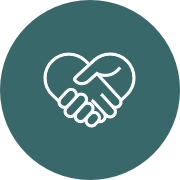ACT Referral Information
Referrals to Assertive Community Treatment (ACT) teams will be accepted from professionals/providers of treatment and/or any other agency/hospital involved in the provision of Human Services. Individuals who are not enrolled in Magellan Behavioral Health services must be submitted to their region of residence for approval. The regions will then forward the referrals to the ACT provider.
PART 1 (Must meet ALL the Criteria in Part 1 to be eligible for ACT):
- Adult, 18 years of age or older
- Diagnosis: Primary diagnosis of schizophrenia or other psychotic disorders such as schizoaffective disorder, or bipolar disorder as defined in the DSM V. Individuals with a primary diagnosis of substance use disorder, intellectual disability, or brain injury are not the intended consumer group
- Difficulty utilizing traditional cases management or office based outpatient services or evidence that they require more assertive and frequent non-office based service to meet their clinical needs
PART 2 (Must meet two (2) out of the six (6) criteria in Part 2 to be eligible for ACT)
- Adult, 18 years of age
- Intractable (persistent or very recurrent) severe major symptoms (affective, psychotic, suicidal)
- Co-occurring mental illness and substance use disorders more than six (6) months duration at the time of contact
- High Risk or Recent history of criminal justice involvement which may include frequent contact with law enforcement personnel, incarcerations, parole or probation
- Literally homeless, imminent risk of being homeless, or residing in unsafe housing
- Residing in an inpatient or supervised community residence but clinically assessed to be able to live in a more independent living situation if intensive services are provided, or requiring residential or institutional placement if more intensive services are not available

In the ACT
RHD’s Assertive Community Treatment Teams promote recovery and independence for people with mental health challenges.
Services maintain and demonstrate fidelity to established best-practice ACT model. Services are outreach-based, and provided mostly in the home and community, rather than in a facility or office. Services are delivered 24 hours a day, seven days a week. The team assumes responsibility for providing services, and does not triage or broker services. The team utilizes a harm-reduction approach for treating persons with a co-occurring substance abuse and mental health diagnosis and report a desire to remain free from the use of mood-altering substances.



